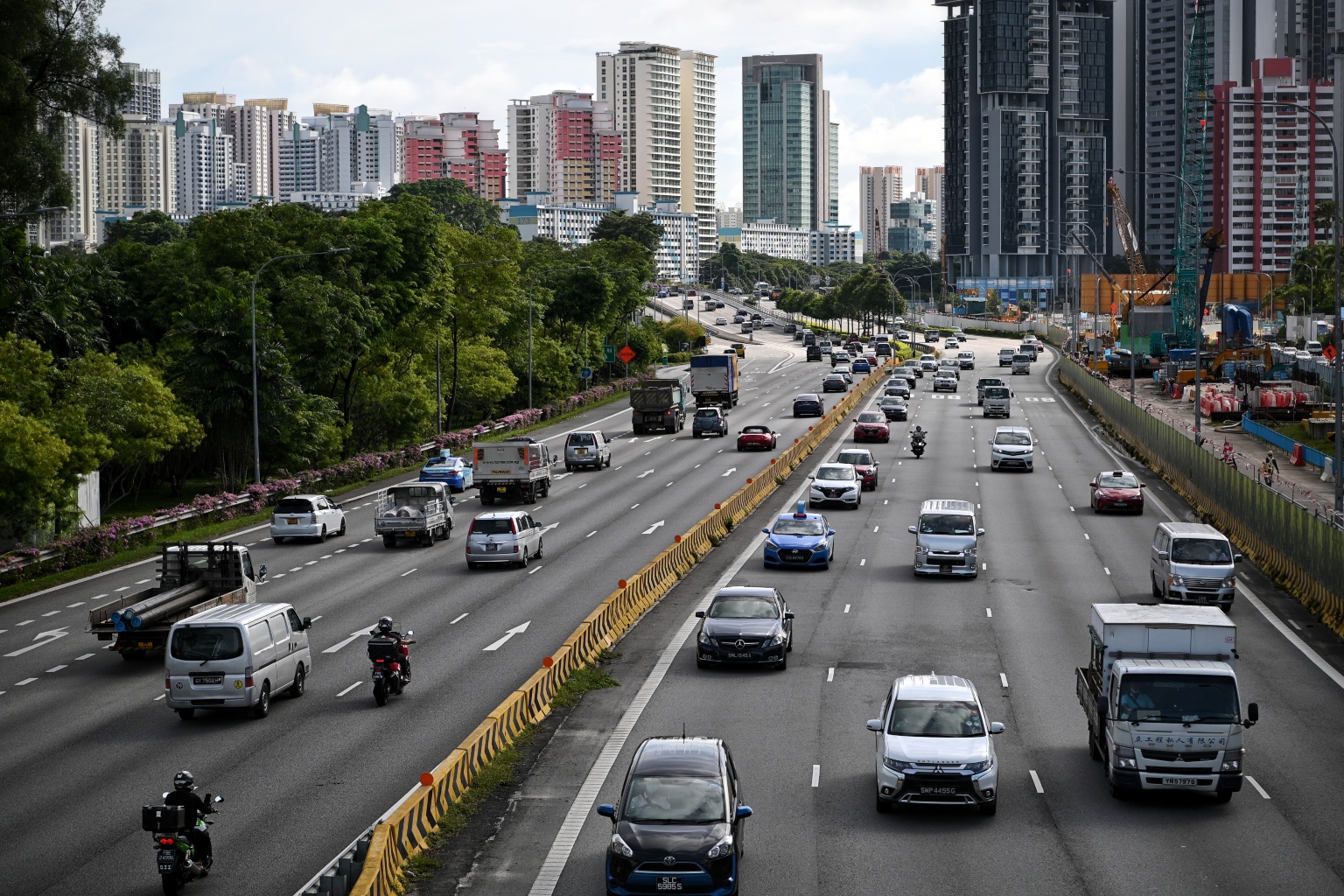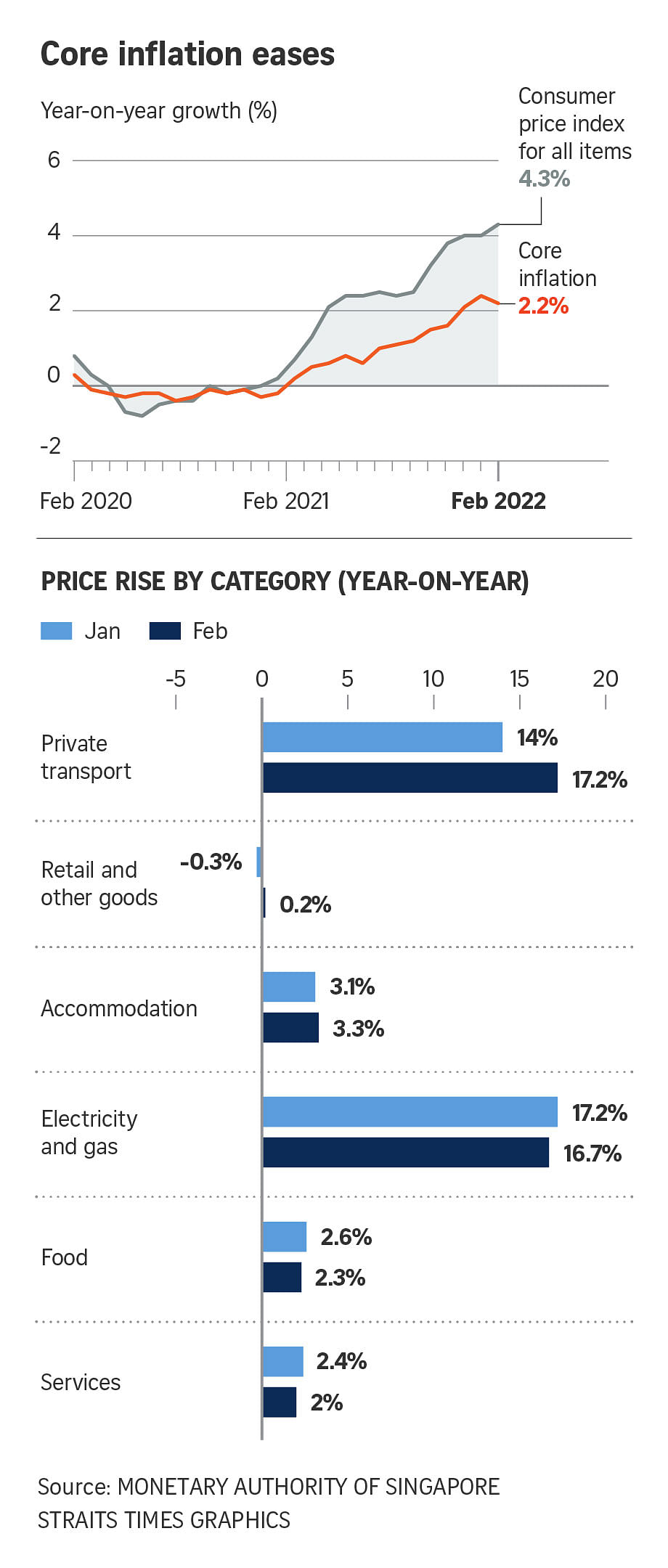Singapore core inflation eases in February but jump in car prices drive up overall inflation
Sign up now: Get ST's newsletters delivered to your inbox

Car and accommodation cost increases are also likely to remain strong in the near term.
PHOTO: ST FILE
Follow topic:
SINGAPORE - The rise in Singapore's core consumer prices slowed last month on lower inflation for services, food and electricity and gas, figures released on Wednesday (March 23) showed .
Core inflation, which strips out accommodation and private transport costs, eased to 2.2 per cent year on year last month after it hit a 10-year high of 2.4 per cent in January.
This surprised economists polled by Bloomberg who expected it to continue its upward climb to 2.6 per cent.
However, overall inflation increased to 4.3 per cent last month, up from 4 per cent the month before, on the back of a jump in private transport inflation.
Global inflation is expected to stay high for some time before easing in the latter half of the year, the Monetary Authority of Singapore (MAS) and the Ministry of Trade and Industry (MTI) said in a joint statement.
"In the near term, heightened geopolitical risks and tight supply conditions will keep crude oil prices elevated. Supply-demand mismatches in commodity markets due in part to geopolitical factors, bottlenecks in global transportation, as well as labour shortages in a number of Singapore's major trading partners, are also likely to persist."
They added that, while ongoing external supply constraints should ease in the second half of this year, leading to some moderation in imported inflation, there remain upside risks to inflation from geopolitical and pandemic-related shocks.
MAS is expected to tighten monetary policy again at its next review in April, according to economists, which will allow the Singapore dollar to appreciate further. The central bank last tightened monetary policy in a surprise off-cycle move in January.
"On the domestic front, the labour market should continue to tighten and lead to strengthened wage pressures over the course of the year. Cost increases are likely to filter through to higher services prices as private consumption picks up," MAS and MTI said.
Experts noted that the full effects of the Ukraine war will be felt in the coming months.
Maybank Kim Eng economists Chua Hak Bin and Lee Ju Ye said: “The Ukraine-Russia conflict intensified in March, driving both food and energy prices higher and disrupting commodity supplies. Core inflation will likely jump in March.
“Domestically, rising wage costs in a tighter labour market and stricter foreign worker measures will filter through to higher services prices.”
OCBC chief economist Selena Ling added that petrol prices will also feed into transport costs, so it just depends on how fast transport operators adjust their fares, although there may be a bit of a time lag for such increases to take effect.
She said: “MAS will tighten monetary policy at the upcoming April meeting, to combat elevated imported inflation, but it’s just a question of how potentially hawkish they may be.”
Car and accommodation cost increases are also likely to remain strong in the near term, keeping headline inflation elevated, they noted.
Private transport costs last month jumped by 17.2 per cent, up from the 14 per cent increase the month before, after Certificate of Entitlement (COE) premiums jumped in February.
COE premiums for Category B and Open Category were at their highest since 2013 during the bidding exercise on Feb 23. The premiums for the larger and more powerful cars in Category B rose the most, from $86,102 to $93,590 - a jump of almost $7,500.
This was followed by the Open category, which can be used for any vehicle type but ends up being used mainly for large cars. Prices went up by $6,102, from $87,000 to $93,102.
The cost of retail and other goods also rose, by 0.2 per cent year-on-year from a decline of 0.3 per cent in January.
Meanwhile, accommodation inflation also edged up, to 3.3 per cent from 3.1 per cent in January, due to a larger increase in housing rents.
On the other hand, electricity and gas prices rose at a slower pace, as the average electricity prices paid by households under the open electricity market saw a smaller increase.
Inflation for this category reached 16.7 per cent last month, a drop from 17.2 per cent in January.
Food inflation also eased, to 2.3 per cent last month from 2.6 per cent the month before.
MAS and MTI noted that lower inflation for non-cooked food such as fish and seafood, as well as fruits and vegetables, more than offset higher inflation for prepared meals.
Services inflation also fell, to 2 per cent, from 2.4 per cent in January, as the cost of telecommunication services fees declined more sharply, while inflation for holiday expenses eased.
"At the same time, inflation for airfares moderated in February as the relaxation of testing requirements led to lower cost of mandatory Covid-19 tests under the vaccinated travel lanes," MAS and MTI said.
Core inflation is forecast to pick up further in the near term, and could reach 3 per cent by the middle of the year before easing in the second half of 2022 as external inflation recedes, they added.
The rising cost of air travel is expected to account for a significant part of the increase in core inflation in the near term.
For 2022 as a whole, core inflation is projected to average 2 per cent to 3 per cent while overall inflation is forecast to come in within 2.5 per cent to 3.5 per cent. These official forecasts were unchanged after being raised in January.


